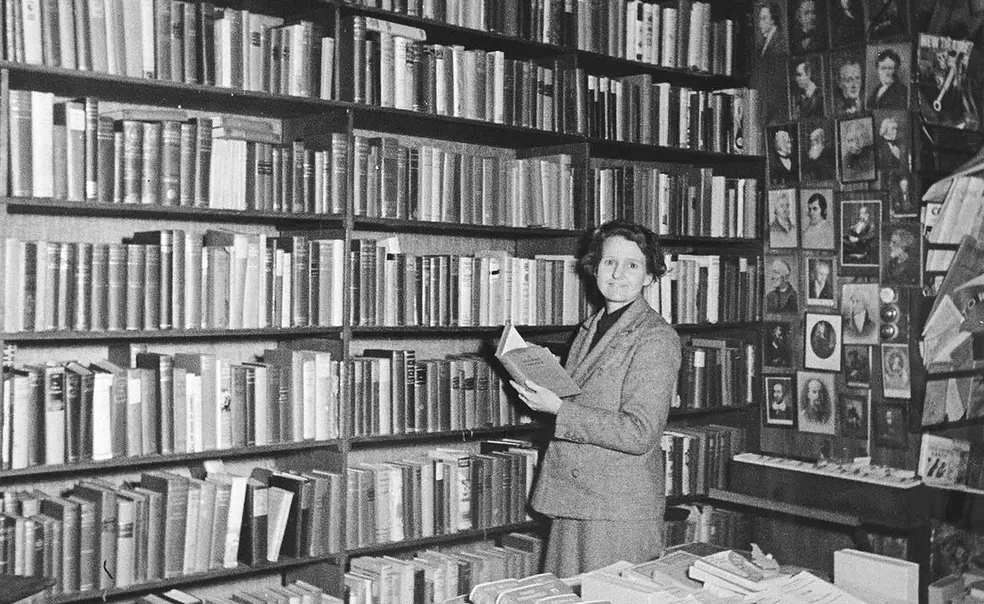Digital Humanities Project Opens Records of Famed French Bookshop
Sylvia Beach, who founded the storied Paris bookstore Shakespeare and Company, a meeting place for expatriate writers such as Ernest Hemingway, Gertrude Stein, and James Joyce, briefly lived in Princeton as a teenager. Her father, the Rev. Sylvester Woodbridge Beach 1876, was named minister of the town’s First Presbyterian Church in 1905. After Sylvia Beach died in 1962, the University purchased much of the contents of her apartment — which was located above the store — and cataloged her papers. They are shelved in 180 archival boxes at Firestone Library, a treasure trove of information on the reading habits of some of the most important writers of the 20th century — and one that, for more than 50 years, researchers had to travel to Princeton to study.
Today, some of the most tantalizing material in the Sylvia Beach Papers has been digitized and is accessible online to everyone as part of the University’s Shakespeare and Company Project. Much of what is now online comes from the bookstore’s lending library, for which Beach kept detailed logbooks as well as lending cards for 640 members, among them Simone de Beauvoir and Ezra Pound. The library, which had thousands of members, was popular with American writers because English-language books were expensive and not readily available in France between 1919 and 1941, when the store was open.
Visitors can search the website for a library member, such as Hemingway, to see which books he borrowed and the dates he withdrew them and returned them. Clicking “cards” reveals images of the handwritten notes kept by the store’s clerks who recorded his loans. Hemingway was a library member, on and off, from 1921 to 1938 and borrowed more than 90 books, including P.T. Barnum’s Barnum’s Own Story, which he kept for a few weeks in the fall of 1927, and Lady Chatterley’s Lover, which he kept for just eight days in September 1929. He borrowed Bull Fighting by Tom Jones in 1926. One also can view his purchases — he bought a copy of his novel A Farewell to Arms at the store — and the addresses where he lived in Paris.
Fans of an author can use the website to “read the books they read and see who else read those books,” said Joshua Kotin, an associate professor of English at Princeton and the project’s director. “We hope this will be a resource for scholars and nonscholars.”
It’s rare to have access to a library’s borrowing records because the American Library Association requires such records be destroyed for privacy reasons, points out Kotin, whose parents are both librarians. “As a scholar, I’m happy Sylvia Beach didn’t follow those guidelines,” he said.
The project, which began in 2014, is an initiative of Princeton’s Center for Digital Humanities, which uses digital methods and technologies to open new avenues of research. In addition to making materials available online, the center employs digital tools to analyze data in new ways. Contributors to the project include staff members at the library and the Center for Digital Humanities, as well as more than a dozen undergraduate and graduate students.
For the Shakespeare and Company Project, researchers will examine the data in numerous ways, such as looking at which books were borrowed most frequently after a date of historical significance, or revealing how much overlap there is between the reading lists of, say, Hemingway and Stein. The data also could be used to map the Paris neighborhoods where well-known writers lived and to examine whether writers who were friends read the same books.
Beach closed the bookstore in 1941 after refusing to sell her last copy of Finnegans Wake to a Nazi officer. A new Shakespeare and Company opened in Paris in 1951, thanks to owner George Whitman, an American who chose the bookstore’s name to carry on Beach’s legacy. Today the shop, run by Whitman’s daughter, remains a gathering place for intellectuals and fans of English-language books. Her name — chosen to honor a legendary figure in literary history — is Sylvia.












No responses yet